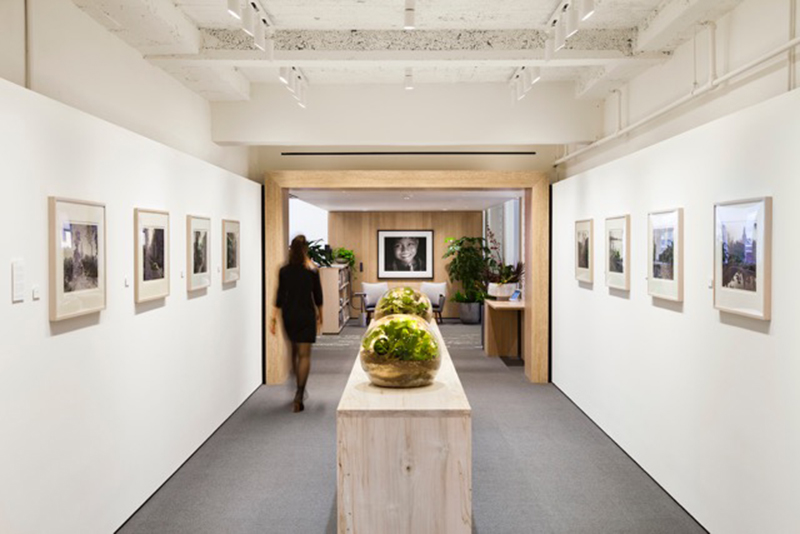Manhattan, NY COOKFOX’s new office space at 250 West 57th St., owned by Empire State Realty Trust, has received both LEED Platinum Certification from the USGBC and WELL Certification at the Gold level from the International WELL Building Institute (IWBI).
Rick Cook, founding principal of COOKFOX, said, “We pursued WELL Certification because most people spend 90% of their time indoors, so the spaces we create have a huge effect on health. COOKFOX has made high-performance buildings and biophilic design the focus of our work; LEED ratings help make our systems intelligent and help us to reduce resource use, while WELL helps us measure our efforts on health.”
Widely known and adopted, the LEED Green Building Rating System for Commercial Interiors is a set of performance standards for certifying the design and construction of tenant spaces for offices. The intent is to promote healthful, durable, affordable, and environmentally sound practices in tenant space design and construction. The WELL Building Standard (WELL) marries best practices in design and construction with evidence-based health and wellness interventions, using metrics in seven WELL concepts: Air, light, nourishment, water, fitness, mind and comfort.
COOKFOX achieved its high rating by implementing strategies, programs and technologies that are designed to encourage healthy, active lifestyles, boost productivity and reduce occupant exposure to harmful chemicals and pollutants.
At 250 West 57th Street COOKFOX occupies the 17th floor; the architects chose this location for its efficient floorplate with abundant natural light and close proximity to Central Park and public transportation. Their space features three terraces for planting and large amounts of windows that connect people to natural-light cycles.
Integration of the WELL Concepts can be seen beginning at the elevator vestibule on the 17th floor. The entry, a crisply demarcated gallery hall, is also an exhibition area, with rhythmic concrete beams establishing a sense of focus and grounded-ness. (Mind.) To the east is the Sunrise Terrace, where urban gardening plots allow studio members to cultivate edible plants for an immediate and intimate connection with food production. When COOKFOX moved, the firm took two apiaries from the previous space, knowing that the bees would enhance the vegetable garden and honor nearly a decade of care and stewardship of the former rooftop garden. Extending from the garden into the studio, a “harvest kitchen” and dining area facilitate social communion between people over the bounty of nature, which COOKFOX believes is fundamental to human wellbeing. (Nutrition.) A purification system filters drinking water, which is monitored for pathogens and heavy metals. (Water.)
Across the studio, facing west, is the Sunset Terrace, an outdoor meeting room with worktables that allow studio members to work in nature in a landscape of trees, wild flowers, sedums, grasses and other wild plants seeded by birds and insects that use the habitat. Along with a third, north-viewing garden, three green spaces incorporate a landscape of sedums, grasses and
soil transplanted from the former studio. Most plantings are drought-resistant. Visual and physical connections with the natural patterns of the terrace extend into the studio space in the use of natural materials and textures that stimulate the same positive biological responses that improve wellness.
High-quality air filtration, fresh air delivery, CO2 monitoring and use of low-VOC materials and the studio’s natural cleaning program ensure the best possible indoor air quality, along with an ionization system to remove odors, particulate matter, toxins and allergens. (Air.) In addition, zoned air-conditioning may
be individually controlled according to occupant needs using the management app Comfy. (Comfort.) The lighting system prioritizes daylight, and the studio is primarily lit by reflected light to approximate more natural, dynamic lighting conditions. When electric light is required, task lights allow personalized lighting with color temperature controls to support healthy circadian rhythms. (Light.)
A commuter’s shower encourages biking, running and walking to work; a secondary kitchen is designed to encourage healthy eating; office planning includes spaces for communal dining to encourage creative social engagement. (Fitness.)
Additional elements of the workplace that support health are non-toxic cleaning protocols, an active waste management program, including composting (on the Sunrise Terrace) and furnishing the office interior with a large number of indoor plants that, like all green things, absorb carbon dioxide, produce oxygen and filter the air.

Sign up is quick, easy, & FREE.







